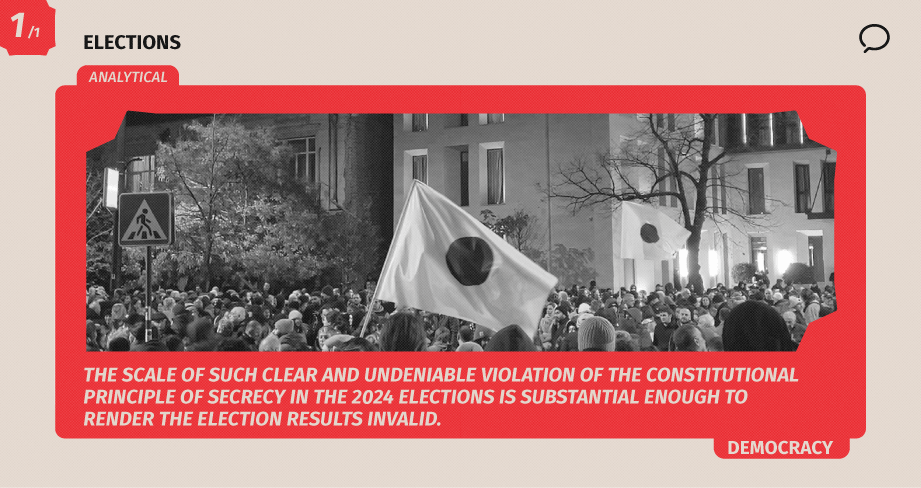



On October 26, 2024, Georgia held its first fully proportional parliamentary elections since gaining independence. Five out of the 18 participating parties surpassed the 5% threshold. The ruling party officially secured nearly 54% of the vote, translating to 89 out of 150 seats.
A large part of society believes that Georgian Dream’s election results were influenced by violations and manipulations both leading up to and on election day. In this article, we will try to review the methods and means the current government employed to secure its “victory”.

The Constitutional Court dismissed the claims filed by the President and MPs concerning the constitutionality of several provisions of the electoral legislation and the October 26 elections held pursuant to these provisions. The Constitutional Court failed to acknowledge its role and position in this dispute and consequently did not consider the claims admissible.

The governance models established under liberal democracies have weakened the political role of citizens and bestowed disproportionate power upon the elite. Over time, it became evident that the concept of political representation of the people fell short of its initial objectives. Growing dissatisfaction and protests posed threats to elite stability, compelling concessions of power. This led to the emergence of participatory democracy, a governance model emphasizing citizen involvement in decision-making processes. With time its mechanisms evolved too. However, states have thus far failed to ensure equal opportunities for participation for all societal groups, particularly ethnic minorities, hindering the consideration of their needs in policy-making and exacerbating societal inequalities. This challenge extends to Georgia as well.

According to the World Health Organization, there has been a notable global surge in both, investment in and the consumption of gambling recently. In Georgia, gambling venues are notably abundant, particularly concentrated in tourist and coastal areas, fostering a rising dependence on gambling, accompanied by a heightened prevalence of associated social risks.
The increasing prevalence of gambling and, moreover, risks associated with it, highlight the necessity of examining the issue from a broader perspective. This extends the discourse to encompass discussion about the models of democracy, the concept of liberty, and public welfare.

Representative democracy claims to operate for the people, exercising power under their authority and in their name. Originally conceived to rectify historical imbalances stemming from the societal dichotomy of “ruling” and “ruled” segments, this model entrusts power to an elected elite, chosen through the democratic process. The distinctive characteristic of the representative system lies in the fact that a singular element – the public interest – serves as the source of both its authority and legitimacy. The legitimacy of representative governance is established through the conscientious consideration of public interests, resulting in a freely made choice. Its legitimacy is upheld when it operates within these interests. However, contemporary scholarly literature frequently discusses the crisis within this model. This crisis, arising from multiple factors, is most distinctly manifested in two key areas – firstly, the crisis of voter representation (who is left outside the political processes and who is included within), and secondly, the crisis of safeguarding the voter’s interests.
The crisis of representation is not only a problem of emerging states. However, it has different foundations and forms in fragile and stable democracies. We will examine this matter through the example of Georgia, concentrating specifically on safeguarding voters’ interests.

In a bipartite political landscape, emotional polarization stands out as the most effective mechanism of voter mobilization. In such an environment, political parties often tend to forego the development of comprehensive strategies to address societal issues. Instead, politics becomes overshadowed by propaganda, as parties seek support through meaningless attacks on their opponents.

The democratic transformation of a state is never successful without a proper response to its repressive past. Contemporary observations of post-repressive states have unequivocally dispelled the notion that “historical amnesia” serves as a remedy for assuaging collective trauma and fostering a resilient democratic framework. Employing oblivion as a governance strategy proves inadequate in supplanting the public memory and constantly creates the risk of inciting conflicts and reinstating oppression.

Democracy has never had the luxury of closing the door to those willing to participate in the governance of the state. Unfortunately, the political elite of Georgia has always acted to the contrary (with rare exceptions), when coming to a decision on this matter.